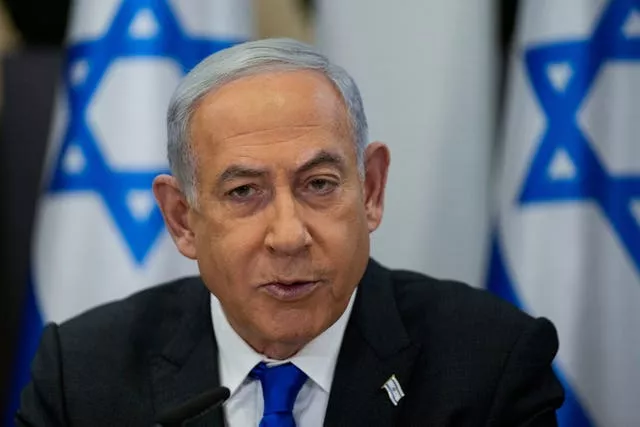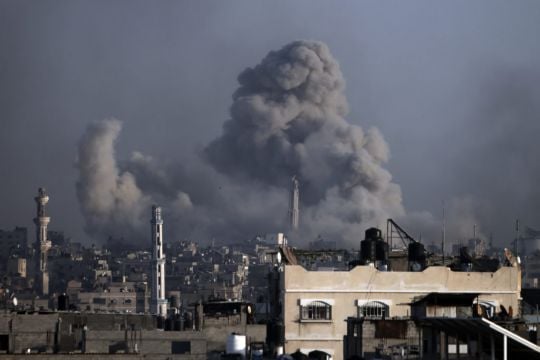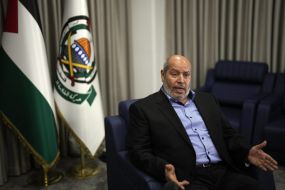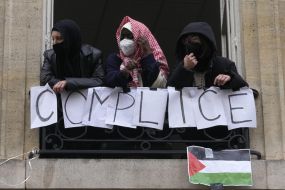Israeli prime minister Binyamin Netanyahu has rejected US calls to scale back Israel’s military offensive in the Gaza Strip or take steps towards the establishment of a Palestinian state after the war, drawing an immediate scolding from the White House.
The tense back and forth reflected what has become a wide rift between the two allies over the scope of Israel’s war and its plans for the future of the beleaguered territory.
“We obviously see it differently,” White House national security spokesperson John Kirby said.
Mr Netanyahu spoke just a day after US secretary of state Antony Blinken said Israel would never have “genuine security” without a pathway towards Palestinian independence.

Earlier this week, the White House also announced that it was the “right time” for Israel to lower the intensity of its devastating military offensive in Gaza.
In a nationally televised news conference, Mr Netanyahu struck a defiant tone, repeatedly saying that Israel would not halt its offensive until it realises its goals of destroying Gaza’s Hamas militant group and bringing home all remaining hostages held by Hamas.
He rejected claims by a growing chorus of Israeli critics that those goals are not achievable, vowing to press ahead for many months.
“We will not settle for anything short of an absolute victory,” Mr Netanyahu said.
Israel launched the offensive after an unprecedented cross-border attack by Hamas on October 7th that killed 1,200 people and took some 250 others hostage.
Roughly 130 hostages are believed by Israel to remain in Hamas captivity.
The war has stoked tensions across the region, threatening to ignite other conflicts.
Israel’s assault, one of the deadliest and most destructive military campaigns in recent history, has killed nearly 25,000 Palestinians, according to Gaza health authorities, caused widespread destruction and uprooted more than 80% of the territory’s 2.3 million people from their homes.

The staggering cost of the war has led to increasing calls from the international community to halt the offensive.
After initially giving Israel wall-to-wall support in the early days of the war, the United States, Israel’s closest ally, has begun to express misgivings and urged Mr Netanyahu to spell out his vision for postwar Gaza.
The United States has said the internationally recognised Palestinian Authority, which governs semi-autonomous zones in the Israeli-occupied West Bank, should be “revitalised” and return to Gaza.
Hamas ousted the authority from Gaza in 2007.
The US has also called for steps towards the establishment of a Palestinian state.
The Palestinians seek Gaza, the West Bank and east Jerusalem for their state.
Those areas were captured by Israel in 1967.
Speaking on Wednesday at the World Economic Forum in Davos, Switzerland, Mr Blinken said the two-state solution was the best way to protect Israel, unify moderate Arab countries and isolate Israel’s arch-enemy, Iran.

Without a “pathway to a Palestinian state”, he said, Israel would not “get genuine security”.
At the same conference, Saudi Arabia’s foreign minister said the kingdom is ready to establish full relations with Israel as part of a larger political agreement.
“But that can only happen through peace for the Palestinians, through a Palestinian state,” he said.
Mr Netanyahu, who leads a far-right government opposed to Palestinian statehood, repeated his longstanding opposition to a two-state solution.
He said a Palestinian state would become a launching pad for attacks on Israel.
Mr Netanyahu said Israel “must have security control over the entire territory west of the Jordan River”, adding: “That collides with the idea of sovereignty. What can we do?”
“This truth I tell to our American friends, and I put the brakes on the attempt to coerce us to a reality that would endanger the state of Israel,” he said.
The comments prompted an immediate rebuke from the White House.

Mr Kirby said that US president Joe Biden would “not stop working” towards a two-state solution.
Before October 7th, Israeli society was bitterly divided over Mr Netanyahu’s plan for a judicial overhaul.
Since the attack, the country has rallied behind the war.
But divisions have once again begun to surface over Mr Netanyahu’s handling of the war.
Families of the hostages and their many supporters have called for a new ceasefire that could bring them home.
Hamas released more than 100 hostages in exchange for Palestinian prisoners during a week-long ceasefire in November.
Dozens of people attended a sombre gathering in Tel Aviv in solidarity with the family of Kfir Bibas, the youngest Israeli hostage, marking his first birthday.
The red-haired infant and his four-year-old brother Ariel were taken hostage along with their mother, Shiri, and their father, Yarden.
All four remain in captivity.
Commentators have begun to question whether Mr Netanyahu’s objectives are realistic, given the slow pace of the offensive and growing international criticism, including genocide accusations at the UN world court, which Israel vehemently denies.
Mr Netanyahu’s opponents accuse him of delaying any discussion of postwar scenarios to avoid looming investigations of governmental failures, keep his coalition intact and put off elections.
Polls show that the popularity of Mr Netanyahu, who is on trial for corruption charges, has plummeted during the war.







